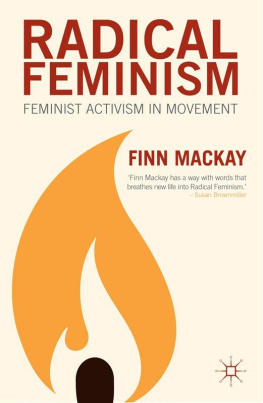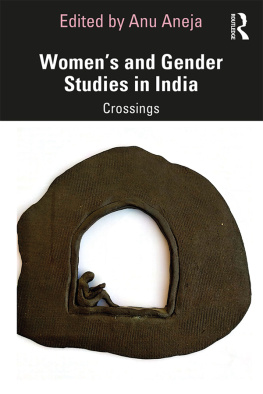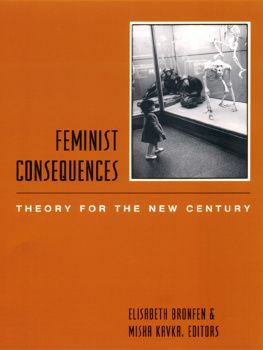Published by
UNIVERSITY OF ALBERTA PRESS
Ring House 2
Edmonton, Alberta, Canada T6G 2E1
www.uap.ualberta.ca
Copyright 2019 Tessa Jordan
LIBRARY AND ARCHIVES CANADA CATALOGUING IN PUBLICATION
Title: Feminist acts : Branching out magazine and the making of Canadian feminism / Tessa Jordan.
Names: Jordan, Tessa, 1983 author.
Description: Includes bibliographical references and index.
Identifiers: Canadiana (print) 20190114207 | Canadiana (ebook) 20190114223 | ISBN 9781772124842 (softcover) | ISBN 9781772125009 (EPUB) | ISBN 9781772125016 (Kindle) | ISBN 9781772125023 (PDF)
Subjects: LCSH: Branching out (Edmonton, Alta.) | LCSH: Womens periodicals, CanadianHistory. | LCSH: WomenCanadaPeriodicals. | LCSH: Womens rightsCanadaPeriodicals. | LCSH: FeminismCanadaPeriodicals. | LCSH: PeriodicalsPublishingCanadaHistory.
Classification: LCC PN4914.W6 J67 2019 | DDC 305.420971dc23
First edition, first printing, 2019.
First electronic edition, 2019.
Digital conversion by Transforma Pvt. Ltd.
Copyediting and proofreading by Lesley Peterson.
Indexing by JoAnne Burek.
Cover design by Alan Brownoff.
All rights reserved. No part of this publication may be reproduced, stored in a retrieval system, or transmitted in any form or by any means (electronic, mechanical, photocopying, recording, or otherwise) without prior written consent. Contact University of Alberta Press for further details.
University of Alberta Press supports copyright. Copyright fuels creativity, encourages diverse voices, promotes free speech, and creates a vibrant culture. Thank you for buying an authorized edition of this book and for complying with the copyright laws by not reproducing, scanning, or distributing any part of it in any form without permission. You are supporting writers and allowing University of Alberta Press to continue to publish books for every reader.
University of Alberta Press gratefully acknowledges the support received for its publishing program from the Government of Canada, the Canada Council for the Arts, and the Government of Alberta through the Alberta Media Fund.
This book has been published with the help of a grant from the Canadian Federation for the Humanities and Social Sciences, through the Awards to Scholarly Publications Program, using funds provided by the Social Sciences and Humanities Research Council of Canada.
For the women of Branching Out .
Foreword
Eleanor Wachtel
I remember attending the AGM of the Canadian Periodical Publishers Association (CPPA), now Magazines Canada, which included such large commercial magazines as Homemakers and City Woman . I found myself sitting next to publishers who couldnt fathom why anyone would create and work at a non-profit magazine. We introduced ourselves. I said I was with Room of Ones Own , a home decorating journal, and this is Sharon Batt, editor of Branching Out , a gardening publication.
This would have been in the late 1970s when I was living in Vancouver and freelancing for those very same glossy monthlies while volunteering as a member of the Growing Room Collective, which produced the literary quarterly, Room of Ones Own . (Amazingly, Room recently celebrated its fortieth anniversary with a robust anthology-cum-history called Making Room , and its still in business.) It was through the CPPA that I came to know Sharon Batt and other editors of feminist and small literary and political magazine. (Sharon became vice-president of the organization, and I was elected to its board of directors.)
It was from this perch that I became engaged with the role of activist periodicals in Canadian cultural and political life. My own experience with feminist publications and with media coverage of feminist issuesincluding some landmark moments that are all too easily forgotten todaymight add to an understanding of this period. A couple of years later, I was invited to write a report on Feminist Print Media for the Womens Programme, Secretary of State. This wasnt that long since the UNs International Womens Year (1975) had focused global attention on the opportunities, status, and perspective of women:
[Do] women really share with men the right recognized to everyone in Article 19 of the Universal Declaration of Human Rights to freedom of opinion and expressionfreedom to hold opinions without interference and to seek, receive and impart information and ideas through any media regardless of frontiers?
The answer is evident ( Women in the Media , UNESCO, 1980)
In Canada, this global attention had led to the creation of legal and union organizations dedicated to women, as well as the National Film Boards Studio D, the first publicly funded feminist film production unit in the world. So it was not surprising that a government department would want to know more about the social impact and financial context of Canadian feminist newspapers and magazines and how they contributed to improving the status of women. This was my mandate.
I researched and, where possible, met with the editors of two dozen feminist publications from coast to coast, plus another six that had recently folded, including Branching Out . Three years later, in 1985, I was contracted to help organize a Feminist Periodical Conference that was held in June of that year and to write an update to my earlier report based on information gleaned from participants. Some of my earlier policy and funding recommendations had been adopted, and the total dollar amount of Womens Programme support had approximately doubled.
In both reports, I wrote in some detail about feminism as a movement for social change and the role played by these periodicals in articulating that, especially in the inhospitable environment of mainstream media. For the update, I elaborated on the kind of coverage the womens movement received and, by way of illustration, I used the example of the nationally televised Leaders Debate on Womens Issues organized during the 1984 federal election by NAC, or the National Action Committee on the Status of Women. As one of the four panellists questioning John Turner (Liberal), Brian Mulroney (Progressive Conservative), and Ed Broadbent (New Democratic), I had followed this very closely and was personally involved, so I went on to analyze it.
Here, perhaps, I should provide a bit more contextwhich is also the backdrop for when Branching Out was born and thrived. In many ways, 1970 was a pivotal year for feminism: the simultaneous publication of groundbreaking books such as Germaine Greers The Female Eunuch ; Robin Morgans anthology of the womens movement, Sisterhood is Powerful ; Shulamith Firestones The Dialectic of Sex: The Case for Feminist Revolution ; and Anne Koedts The Myth of the Vaginal Orgasm . In Canada, the Report of the Royal Commission on the Status of Women was released.
There was a lot going on in the early 1970s. In 1971 came Margaret Atwoods fierce collection of poetry, Power Politics , with the unforgettable
You fit into me
like a hook into an eye
a fish hook,
an open eye
Also in 1971, frustrated by the inaction of the Canadian government in implementing the Royal Commission Reports recommendations (on issues such as daycare, birth control, maternity leave, family law reform, education, and pensions), NAC was formed to coordinate information and action among various womens organizations to put pressure on the government. By 1984, it represented hundreds of such groups.







